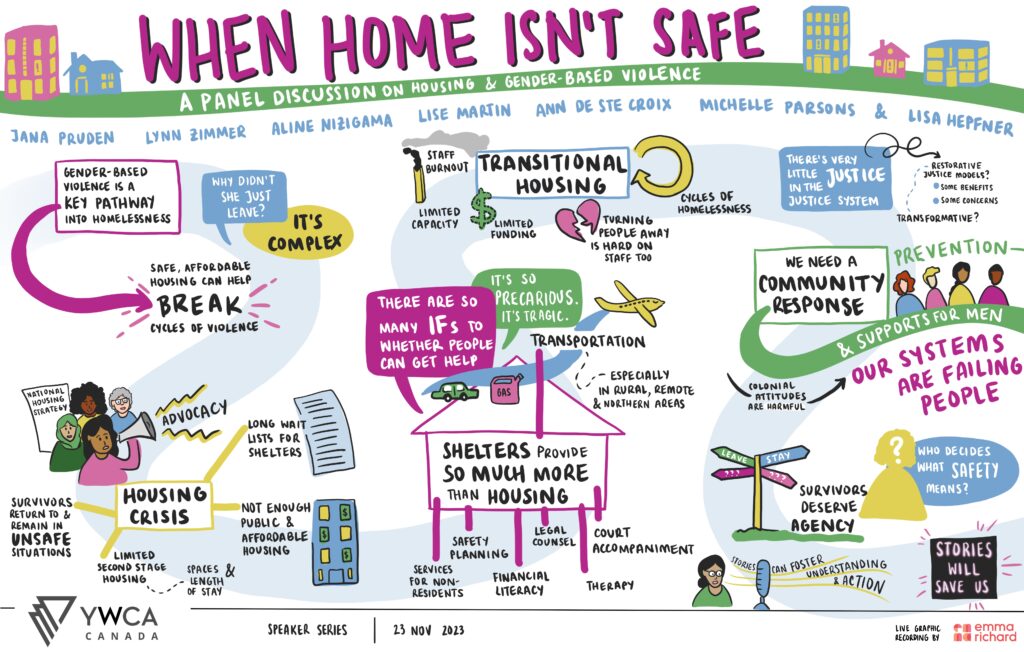Gender-based violence (GBV) is a pathway to homelessness and housing precarity keeps survivors in unsafe living situations. Despite how interconnected the issues of gender-based violence and homelessness are, this connection remains largely unseen by policymakers and the public.
As a part of our 16 Days of Activism Against Gender-Based Violence programming, YWCA Canada hosted a panel event “When Home isn’t Safe: A Panel Discussion on Housing & Gender-Based Violence”. Through a powerful conversation between Lise Martin (Executive Director,Women’s Shelters Canada), Jana Pruden (Journalist & Host, In Her Defence Podcast), Michelle Parsons (Executive Director, Yukon Women’s Transition Home Society), Aline Nizigama (CEO, YWCA Canada), Lynn Zimmer (One of Founders, Interval House), Ann de Ste Croix (Provincial Coordinator, Transition House Association of Nova Scotia) and facilitated by Parliamentary Secretary to the Minister for Women and Gender Equality and Youth Lisa Hepfner, participants learned more about the origins of the women’s shelter movement in Canada, how the housing crisis is deeply connected to GBV, and the impacts of the housing crisis on women, gender-diverse people, and their families. This discussion focused on the realities of survivors across Canada and the ongoing and collaborative advocacy efforts for the implementation of the National Housing Strategy.
Here are some key learnings and takeaways from this powerful discussion:
- Lynn Zimmer and Lise Martin shared with us the origins of the women’s shelter movement in Canada, emphasizing the early struggles and importance of community support. As shelters evolve to meet the emerging needs of survivors, many people are unaware that they don’t need to stay at a shelter to access shelter services. Supports offered include safety planning, court accompaniment, legal advocacy, therapy counselling for adults, transportation, financial literacy, and budgeting.
- Lise highlighted the involvement of Women’s Shelters Canada in the development of the National Housing Strategy, a 10-year plan launched in 2017. Advocacy efforts, in collaboration with partners like YWCA Canada, led to a commitment that least 25% of National Housing Strategy investments would be dedicated to projects for women and their families. While this commitment is a significant achievement for the sector, Lise traced the challenges in transparency and accountability. Sustained advocacy efforts led to the creation of the Women and Children Shelter and Transitional Housing Initiative, announced in Budget 2021, providing $250 million specifically for shelters and transition houses, which has had substantive impacts on communities across Canada. YWCA Canada and Women’s Shelters Canada are working together to advocate for the renewal and replenishment of the much-needed dedicated fund.
- Michelle Parsons highlighted the pressing need for more resources to address GBV in the Yukon. For rural and remote communities, accessing shelters when needed is a huge challenge and makes the process overwhelming for survivors of GBV and intimate partner violence (IPV). Michelle painted the realities of communities in Yukon, that are not all accessible by vehicle and many don’t have anywhere for people fleeing violence to go. For those that do get into Transitional Housing, the maximum stay allowance is not reflective of the long lead time to get into Public Housing. Second-stage housing and rental supports have been able to bridge some of these gaps, but more supports are needed.
- Lise discussed Women’s Shelters Canada’s annual Shelter Voice survey, bringing together the voices of shelter workers across Canada. This year’s results emphasized the connection between overcapacity in shelters, the difficult need to turn away women and children regularly, and the persistent lack of housing.
- Ann de Ste Croix shared similar concerns around ongoing capacity issues in Nova Scotia and the challenges of providing sustained support to survivors when funding doesn’t cover the actual costs associated with running a transition house and providing services to the most vulnerable. She dispelled the misconception that the housing crisis is only an urban problem, and that it is very much a pervasive issue in rural communities. Frontline staff have a difficult time turning women away due to lack of space. They recognize that women aren’t able to move on – they’re staying in shelters longer and shelters aren’t able to provide services to others who are in need of them. Ann also shared that the staffing and retention issue is so stark that some of their executive directors have had to fill in on night shifts, because there’s just not enough staff to keep the shelters open.
- All panelists agreed on the importance of recognizing that survivors are the experts of their own lives, especially in addressing GBV. There is work to be done in community response, in prevention, and supporting men to be healthy individuals.
- Finally, through the insights of Jana Pruden and Aline Nizigama, the discussion emphasized the difficulty of sharing personal stories but that nonetheless, storytelling holds transformative power. Aline shared that YWCA Canada places focus on survivors’ stories and how important it is that lived experiences contribute to shaping programs and advocacy efforts. Jana shared that during the production of her podcast, she received so many stories that highlight the core need for ongoing discussion in breaking stigma around survivors of GBV and IPV. As Jana shared, stories will save us.
Emma Richard, graphic recorder & illustrator, documented this insightful discussion with a visual representation. Click here to see the process of creation!
